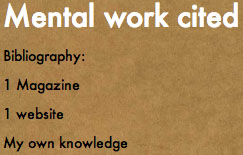
Image Credit:
Screenshot from Sh#$ My Students Write
Although teaching a descriptive unit is an essential foundation for good writing, many instructors find summary tedious to teach, and especially difficult to present to students in interesting, innovative ways. In my class, we learn how to adopt the descriptive mode as historiography, giving students a chance to both practice good summary and question the processes by which summary is produced and presented in a common rhetorical context. Nonetheless, students are usually anxious to move on to analysis as we wrap up the first unit.
Aside from just tending toward dreariness, unfortunately, at least in my experience, descriptive units also tend to have the highest instance of plagiarism, despite the fact that the skill instructors expect students to demonstrate—clear, cogent summary—is arguably the easiest rhetorical mode to grasp in lower-level rhetoric and writing classes. Certainly, most students will understand summary quickly, and many also tend to rely heavily on summary when analyzing or evaluating the merits of an argument. Why is it, then, that incidents of plagiarism are highest when the performative bar is lowest? Is there a correlation between the assignment difficulty and academic dishonesty? In other words, how much credence can we give to arguments that plagiarism is an act of desperation or the result of an overworked, overtaxed cohort of undergraduates?
I think we might find better answers by addressing lack of interest and lack of engagment. Bad information tracking often leads to students passing off something they’ve read as common knowledge, which is less of an attribute of a digital generation of students than it is of a digital generation of enforcers. Common knowledge has always been a tricky concept to define: The University of Texas’ academic dishonesty policy clearly states that “common knowledge” (things, of course, that require no citation) is a flexible category, and that what constitutes common knowledge
often depend[s] on the context, such as the academic discipline of a particular course or the writer's field of study orprofession. For example, what is considered common knowledge for an academic journal may not hold true for an undergraduate composition course.
But instructors with digital searching tools can now easily identify the source of uncited information through a simple Google search. Siphoning out “common” from “uncommon” knowledge before the Boolean search was nearly impossible, and so more often, marginal comments would read “source?” rather than “plagiarized.”
And what is “common knowledge” to students writing outside of their home discipline? Introductory rhetoric courses contain students that have benefitted least from common core curricula or standards of academic performance because they have experienced neither broad university-level writing training nor share specific disciplinary training. Classroom diversity in terms of socioeconomic, educational, and language background is a given in most classrooms (at least, in universities that cultivate a diverse student body), but diversity of disciplinary training is an attribute mostly of lower-level or general-curriculum courses. The instructor is faced with a dilemma when making choices about teaching foundational skills to classrooms with extremely mixed needs. The instructor often finds him or herself ethically obligated to teach to the lowest level of student skill, with the unfortunate potential side effect of losing the interest of other student contingents.
While summarizing might be a basic skill, avoiding plagiarism is certainly more nuanced. As Rebecca Moore Howard argues, the line between paraphrase and plagiarism is subjective. (Howard’s own syllabi argues that “patchwriting,” or “copying from a source text and then deleting some words, altering grammatical structures, or plugging in one-for-one synonym-substitutes” does not constitute plagiarism, but merely “poor writing.”) Common knowledge is also a subjective, context-dependent category. In other common plagiarism situations, such as the presentation of direct quotations as paraphrase with the appropriate in-page citation, the intent of the student is often unclear.
Many pedagogical resources on the internet suggest ways to present this nuance--acknowledging the nuances of plagiarism and engaging in meta-teaching, emphasizing building scholarly ethos, spending more classroom time on concrete examples of plagiarism, discussing the changing face of intellectual property in the digital age to clear up confusion about authorship, etc. But not many professors or instructors address the issues I’ve just highlighted above: that loss of interest while teaching critical skills can prevent some students who can easily understand the nuances of plagiarism from paying any attention to them. The assumption of knowledge can foreclose the possibility of understanding in this case.
I’d like to then posit that the most effective strategy for avoiding plagiarism is not an instructor’s presentation of knowledge but his or her insistence on engagement with that knowledge. Testing students on subtler forms of plagiarism for a nominal grade encourages engagement with the material that even the most eloquent academic honesty policy does not. This will do nothing to deter malicious plagiarism—buying papers, colluding on papers, or copy-and-pasting papers—but these instances of plagiarism are far less common. A simple, tested response to common issues of plagiarism, even one given at the beginning of each new unit, might do wonders in decreasing plagiarism incidents without forcing the instructor to assume a policing stance.

